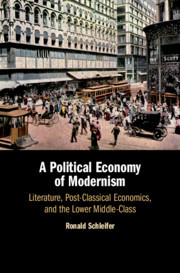A Political Economy of Modernism Literature, Post-Classical Economics, and the Lower Middle-Class
Langue : Anglais
Auteur : Schleifer Ronald

Analyzes the complex unity of modernist culture, paying special attention to artistic, intellectual, and social institutions that embody value.
In A Political Economy of Modernism, Ronald Schleifer examines the political economy of what he calls 'the culture of modernism' by focusing on literature and the arts; intellectual disciplines of post-classical economics; and institutional structures of corporate capitalism and the lower middle-class. In its wide ranging study focused on modernist writers (Dreiser, Hardy, Joyce, Stevens, Woolf, Wells, Wharton, Yeats), modernist artists (Cézanne, Picasso, Stravinsky, Schoenberg), economists (Jevons, Marshall, Veblen), and philosophers (Benjamin, Jakobson, Russell), this book presents an institutional history of cultural modernism in relation to the intellectual history of Enlightenment ethos and the social history of the second Industrial Revolution. It articulates a new method of analysis of the early twentieth century - configuration and modeling - that reveals close connections among its arts, understandings, and social organizations.
1. Methodological prologue: the constellation of modernism; Part I. Economics in the Context of Cultural Modernism: 2. The argument; 3. Modernism and economics: the long history and immediate history of modernism; Part II. Intangible Assets: Modernist Economics: 4. The origins of corporate influences on the arts: technological innovations, intangible assets, and the shapes of aesthetic experience; 5. Modernist goods, modernists arts: consumption and commodities in the new twentieth century; Interlude: from economics to discourse: economic fact, semiotic fact; Part III. Intangible Liabilities: Class and Value in the Time of Modernism: 6. The lower middle-class: literature, economics, and the shape of modernism; 7. Political economy and the fictions of finance: the modernism of Dreiser and Wells; Conclusion: cosmopolitan modernism.
Ronald Schleifer is George Lynn Cross Research Professor of English and Adjunct Professor in Medicine at the University of Oklahoma. He has written or edited more than twenty books, including: Modernism and Time (Cambridge, 2000) and Modernism and Popular Music (Cambridge, 2011). His most recent books are Pain and Suffering (2014; translated into Chinese, 2017); The Chief Concern of Medicine: The Integration of the Medical Humanities and Narrative Knowledge into Medical Practices (co-authored with Dr Jerry Vannatta, 2013). He is co-editor of Contemporary Literary Criticism (1998) and is the former editor of Genre.
Date de parution : 10-2018
Ouvrage de 350 p.
15.9x23.5 cm
Thème d’A Political Economy of Modernism :
© 2024 LAVOISIER S.A.S.
